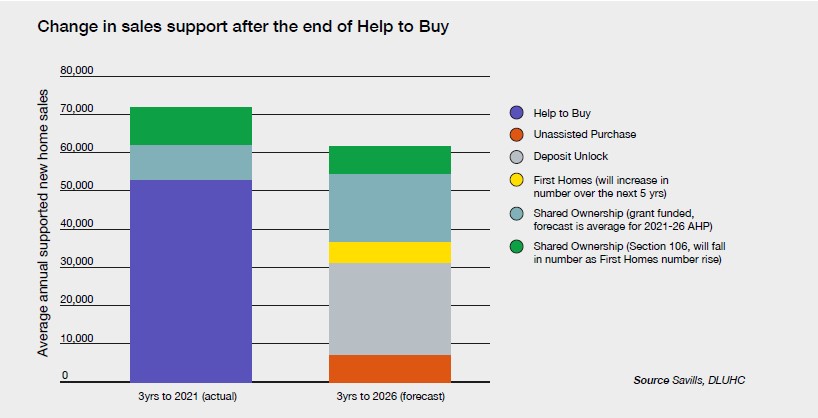
4 minute read
Deposit Unlock: can it match Help to Buy’s success?
It’s no exaggeration to say that Help to Buy has been a massive boon to the housing industry and homebuyers alike.
Across a ten-year span that saw the national economy and political arena faced with some tumultuous events and challenges, the scheme was rock-steady, helping some schemes that might not have happened bridge the gap and come to fruition.
However, after just over a decade, the Help to Buy Scheme closed to new applications as of 31st October 2022. The most recent statistics show that 369,075 new homes were supported with a collective value in excess of £103bn.
The majority of these transactions (83%) were first time buyers, who without this may not have been able to enter the market.
So, what next?
We spoke to Freddie Scarratt, director at Gallagher Re, a company that was the architect of the forerunner of Help to Buy, and has since designed a potential successor in Deposit Unlock.
Freddie told us that Deposit Unlock is an insurance-led, low-deposit mortgage solution owned by the housebuilding industry, and managed by Gallagher Re.
The scheme enables first-timer buyers to purchase a new-build home with a small deposit. It provides mortgage insurance to lenders, allowing them to lend on newbuild housing with a 95% loan-to-value, meaning reduced risk exposure.
Origin story
Seventeen members of the Home Builders Federation (HBF), saw the writing on the wall with Help to Buy, recognising that a private sector mortgage guarantee scheme would be required as an alternative.
On their behalf, the HBF (along with Homes Scotland) commissioned Gallagher Re to design, initiate and implement a solution to fill the void left in the high LTV lending space.
Why? Through all the turmoil at national government level, it’s been clear for some time that alternative ways of supporting the sector are required. With the cost of living crisis further impacting families’ finances and the ability to save a sizeable deposit, more ideas were needed.
Where it’s at and where it’s going
Since the product was first developed, more developers have recognised the potential, with the list of housebuilders participating in Deposit Unlock now approaching 50.
This includes the biggest players in national housing: the likes of Barratt Developments, Bellway Homes, Countryside and Crest Nicholson, but also a growing number of regional players working at different volumes.
The lending side is growing too, with regional lenders alongside Nationwide, the country’s largest building society, among those to have signed up.
The scope of Deposit Unlock is unlimited; the scheme has been designed so that, in theory, it could replicate the scale of Help to Buy.
At present, the Deposit Unlock scheme is only open to members of the HBF.
How does it compare with others?
There are other solutions, which, with the volume of new homes required in the UK, is a good thing. Shared ownership schemes through registered housing providers remain part of the picture within the lower-cost housing bracket.
Shared ownership grew each year for five years from 2015, according to government figures, however, by 2020-21, it had decreased by 6% year-on-year, to 17,097 homes completed in the year.
In September 2022, the Green Finance Institute released research suggesting a growing appetite for financial products linked to energy-efficient homes, and it’s true that the last few years have seen growth in “green mortgages” offered by both the main national lenders and local providers.
But this remains a relatively niche area. The issue so far is that none have been able to match the rates offered in the mainstream market; the green mortgage, particularly in tight times, is an “expensive option”.
It’s our belief that, in this economic climate, Deposit Unlock will be a powerful tool in opening up the housing market to those who’d previously struggled to crack the code. The track records of the partners already committed speak for themselves, and momentum’s growing all the time.
Should you wish to know more about Deposit Unlock, LDS is only too happy to make introductions to the HBF.






